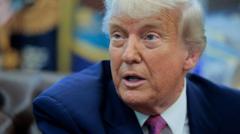As tariffs rise, U.S. companies report increased attempts at tariff evasion, highlighting weaknesses in government enforcement. Fraudulent shipping practices, including misrepresenting product origins and values, pose significant challenges for manufacturers.
Surge in Tariff Evasion Tactics as U.S. Firms Face Growing Trade Fraud

Surge in Tariff Evasion Tactics as U.S. Firms Face Growing Trade Fraud
U.S. companies are reporting an alarming rise in trade fraud as efforts to evade President Trump’s tariffs escalate, prompting concern over the efficacy of government enforcement.
In recent months, as President Trump’s administration has heightened tariffs on various imports, U.S. companies have encountered a surge in offers from dubious shipping firms offering to help them bypass these financial obligations. A spike in fraudulent behavior has emerged, particularly from Chinese exporters reaching out to American businesses engaged in the import of items such as apparel, automotive components, and jewelry.
Many of these illicit solicitations promise ways to eliminate or significantly lower imposed tariffs, as evidenced by emails stating claims like “We can avoid high duties from China” and “Beat U.S. Tariffs,” effectively enticing firms with methods that the government considers deceptive. One email blatantly exclaimed, “Good News! The tariffs have been dropped finally!”
This rise in fraudulent activities comes as tariffs have dramatically increased, creating a financial incentive for businesses to find loopholes. Experts are characterizing these practices not as “solutions,” but rather as customs fraud that undermines the enforcement of U.S. trade laws. Businesses might be reporting lower declared values for their shipments or falsely claiming products sourced from countries with lesser tariffs to avoid additional expenses.
As U.S. manufacturers grapple with these illicit practices, the lack of robust government mechanisms to combat this rise in fraudulent evasion has raised alarms. Commenting on this scenario, a manufacturing executive noted that enforcement efforts resemble a "game of Whac-a-Mole," where attempting to combat one issue simply leads to the emergence of another.
In essence, the imposition of high tariffs, initially intended to protect domestic industries and encourage fair competition, has ironically fostered an environment rife with fraudulent activities, complicating the trade landscape and posing a challenge for legitimate businesses trying to operate within fair market conditions. The situation continues to evolve as companies seek to navigate these treacherous waters amidst increasing governmental scrutiny and enforcement actions.
Many of these illicit solicitations promise ways to eliminate or significantly lower imposed tariffs, as evidenced by emails stating claims like “We can avoid high duties from China” and “Beat U.S. Tariffs,” effectively enticing firms with methods that the government considers deceptive. One email blatantly exclaimed, “Good News! The tariffs have been dropped finally!”
This rise in fraudulent activities comes as tariffs have dramatically increased, creating a financial incentive for businesses to find loopholes. Experts are characterizing these practices not as “solutions,” but rather as customs fraud that undermines the enforcement of U.S. trade laws. Businesses might be reporting lower declared values for their shipments or falsely claiming products sourced from countries with lesser tariffs to avoid additional expenses.
As U.S. manufacturers grapple with these illicit practices, the lack of robust government mechanisms to combat this rise in fraudulent evasion has raised alarms. Commenting on this scenario, a manufacturing executive noted that enforcement efforts resemble a "game of Whac-a-Mole," where attempting to combat one issue simply leads to the emergence of another.
In essence, the imposition of high tariffs, initially intended to protect domestic industries and encourage fair competition, has ironically fostered an environment rife with fraudulent activities, complicating the trade landscape and posing a challenge for legitimate businesses trying to operate within fair market conditions. The situation continues to evolve as companies seek to navigate these treacherous waters amidst increasing governmental scrutiny and enforcement actions.





















